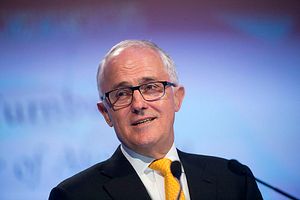Australia’s government has just limped through its most farcical week since the 2013 election, courtesy of a dual-citizenship scandal that has shaken the parliament and threatened the Turnbull government’s slim one-seat majority.
Since Senator Scott Ludlam announced his shock retirement after the discovery that he held New Zealand citizenship in July, six other parliamentarians have discovered their own dual citizenship. Dramatically, one of these MPs was Australia’s Deputy Prime Minister and Minister for Agriculture Barnaby Joyce.
Australia’s constitution is unequivocal: any person who “is under any acknowledgment of allegiance, obedience, or adherence to a foreign power, or is a subject or a citizen or entitled to the rights or privileges of a subject or a citizen of a foreign power” is ineligible to sit in parliament.
The wording is strict and consequential. One expert even argues that no Australian citizen is technically eligible to sit in parliament, as New Zealand – a “foreign power” – grants all Australian citizens almost all the “rights or privileges of a subject or citizen.”
Joyce made his announcement to a stunned parliament. The deputy prime minister was typically red faced, but this time it was humiliation, not bluster, that stoked his blush. His case is now up for review in the High Court.
Joyce’s dual-citizenship could see the Turnbull government lose its one-seat majority in the lower house of parliament, therefore losing government outright. Should Joyce be found constitutionally ineligible for election, he will lose his seat. Retrospectively, every ministerial decision he has made will be up for review, and so too will every act his vote helped carry in this parliament.
Desperate for a distraction, the government tried to blame the Opposition, a decision that led to Foreign Minister Julie Bishop escalating Joyce’s personal oversight into a diplomatic incident with New Zealand.
The government’s tactic was based on tentative evidence: Media reports suggested that an opposition Australian Labor staffer had contacted a New Zealand Labour politician regarding Joyce’s citizenship. The New Zealand MP even followed up on the inquiry.
The Turnbull government jumped on the Australian Labor Party’s alleged indiscretion. Bill Shorten, the opposition leader, had “conspired with a foreign power” they fumed. The foreign minister overstepped, declaring that she would not be able to trust a New Zealand Labour government, should they win next month’s New Zealand election, as they were complicit in a treasonous attempt by Australian Labor to “steal government.”
The relationship – once unshakable – is now shaken.
Predictably, New Zealand confirmed it was media inquiries, not the Labor staff, that tipped them off to Joyce’s citizenship status. The treason was fiction.
It was a case study in how not to manage a crisis: even if the Opposition were responsible for exposing Joyce’s citizenship, the blame lies firmly with Joyce – his ignorance over his citizenship status the fault of no one but himself. No observer could credibly suggest otherwise.
Remarkably, four days after Joyce’s announcement, it turned out that his National Party deputy, Fiona Nash, was also under a cloud. She announced her British citizenship in the final act of business as parliament disbanded for another break.
Nash’s announcement almost felt unsurprising, so all-consuming has this citizenship debacle become. But it served to drive home the reality that the Government’s woes were their own creation – not the result of an elaborate conspiracy.
As the crisis dragged on, the laughter on the Opposition benches grew louder. It was the raucous howling of a party watching their path to power being paved by a government in freefall.
The public’s feelings after a chaotic week were made clear in a national Newspoll – one of Australia’s most respected gauges of public opinion – which saw the Government’s standing continue to fall. Were an election held today, Turnbull’s short and ineffective premiership would end in electoral oblivion.
There is a fundamental irony in this ongoing citizenship fiasco: Every member of parliament, on their election to office, must swear an oath to a foreign Queen sitting on a throne at Canberra’s antipodes.
Allegiance to Buckingham Palace is demanded, while any perceived allegiance to Westminster Abbey is high treason. The cold and inescapable wording of the constitution has no sense of irony.
In the midst of the chaos, however, one moment stood out. The government’s leader in the Senate, Attorney-General George Brandis, made an impassioned speech in response to far-right Senator Pauline Hanson’s shameless stunt, in which she mockingly donned a burqa into the Senate chamber.
Brandis eviscerated Hanson, condemning her stunt and defending multiculturalism, drawing a standing ovation from most of his political opponents in a rare moment of bipartisanship. The attorney-general’s call for reason above hysteria stood in stark contrast to the week’s comical events.
But no speech could arrest the inescapable narrative that the government – no longer capable of governing itself – is struggling to govern the nation.
Edward Cavanough is an Australian researcher and writer focusing on public policy and international affairs. His writing has featured in Al Jazeera, The Guardian, The Sydney Morning Herald, The Hill, Huffington Post, and more. www.edwardcavanough.com

































